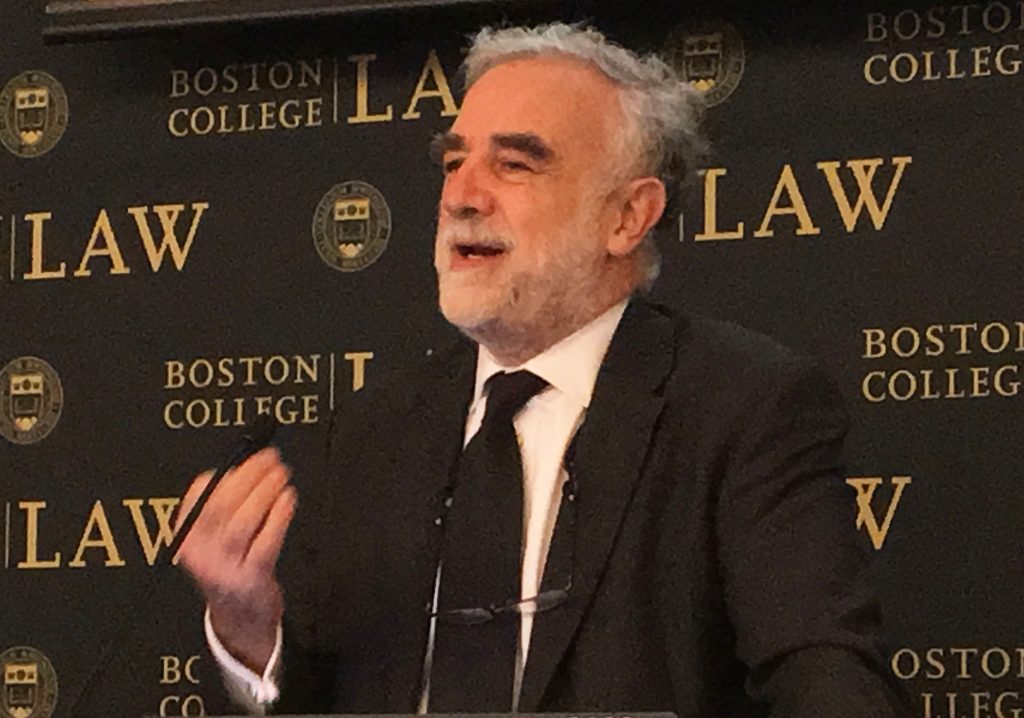Luis Moreno Ocampo, the famed Argentine lawyer and first prosecutor of the International Criminal Court (2003-2012), visited BC Law on to introduce a screening of Argentina, 1985. The film, nominated for the Academy Award for Best International Feature Film at this year’s ceremony, dramatizes the “Trial of the Juntas” which took place in Buenos Aires in 1985; it marked the first major war crimes trial conducted since the Nuremberg Trials were held at the conclusion of WWII.
Moreno Ocampo was the natural choice to introduce the film because he also happens to be one of its main characters. Portrayed by Peter Lanzani in the film, the Moreno Ocampo of Argentina, 1985 is the picture of youth—sporting bushy eyebrows and thick, curly brown hair—with all of the naïveté that accompanies it. The older Moreno Ocampo introducing the film at BC Law on March 20, now white-haired and wiser with age, still manages to emanate the youthful energy the audience saw onscreen.
Argentina was ruled by a military junta between 1976 and 1983, when a democratically elected government was finally restored in the aftermath of the Falklands War. Those years were marked by state terrorism against leftist political dissidents and supporters of Peronism, the social-populist ideology of President Juan Peron and his successor, Isabel Peron. At least 30,000 people were abducted, tortured, and killed in detention camps; the desaparecidos, those who were never seen or heard from again, were often thrown from aircraft over the Atlantic Ocean to provide plausible deniability for the dictatorship. Grassroots efforts by surviving family members to hold the government accountable eventually helped in part to restore democracy there.
Members of the junta insisted that they be tried by military courts, which declined to press charges; through the efforts of Moreno Ocampo and lead prosecutor Julio César Strassera, the junta was brought under the jurisdiction of the civilian courts. Unable to convince Argentina’s conservative legal establishment to assist in the novel prosecution, Moreno Ocampo and Strassera assembled a team of law school students and inexperienced young attorneys who bucked expectations and eventually brought those responsible to justice.
Professor Daniel Kanstroom introduced Moreno Ocampo, and highlighted the prescience of the film: “Moreno Ocampo’s legacy has become quite relevant in light of the Russian invasion of Ukraine and recent indictment of Vladimir Putin.” Perhaps, Kanstroom suggests, the international law community has something to learn from Argentina, 1985.
Moreno Ocampo noted how young people had connected with the film and the way it centers youthful activism in the pursuit of justice. “They say you fight your wars twice: First on the battlefield, and then in the memory of the survivors. Our obsession was to collect as much evidence as we could, to convince the judges and to convince the people that didn’t believe us. And that’s a lesson that crosses time and generations,” he said.
The day after the film’s showing, Moreno Ocampo provided another perspective on national upheavals during his talk, “Preventing Violence Through a Culture of Tolerance,” which was sponsored by BC Law’s Holocaust/Human Rights Project (HHRP).


